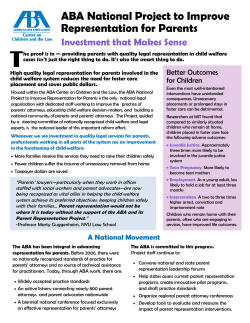
A Desk Guide Indian Child Welfare Act (ICWA)
Indian Child Welfare Act (ICWA) A Desk Guide November 2011 Casey Family Programs is the nation’s largest operating foundation focused entirely on foster care and improving the child welfare system. Founded in 1966, we work to provide and improve — and ultimately prevent the need for — foster care in the United States. As champions for change, we are committed to our 2020 Strategy for America’s Children — a goal to safely reduce the number of children in foster care and improve the lives of those who remain in care. Casey Family Programs Indian Child Welfare Programs 1999 Broadway Suite 1415 Denver, CO 80202 Phone: 303.871.8201 www.casey.org This Indian Child Welfare Act (ICWA) desk guide is a general reference for the Casey Family Programs practitioner about the major provisions of the ICWA and the laws and policies regarding the application of the law in their respective jurisdictions. Some states provide guidance regarding ICWA in their policy manuals and through training; other states have codified ICWA in state law or have defined terms used in the ICWA in state statute, while others have codified only certain aspects of ICWA. This desk guide is neither exhaustive nor does it contain legal advice. If legal advice is necessary, consult an attorney with ICWA experience. Additional resources are identified on page five of this guide. Please call Casey’s Indian Child Welfare Programs in Denver if you have questions. Indian Child Welfare Act A Desk Guide Frequently Asked Questions Why is there an Indian Child Welfare Act? The Indian Child Welfare Act 25 U.S.C. § 1901 was passed by Congress in 1978. Official congressional findings provide the rationale for passage of the act: Recognizing the special relationship between the United States and the Indian tribes and their members and the Federal responsibility to Indian people, the Congress finds that: (1) clause 3, section 8, Article I of the United States Constitution provides that “The Congress shall have the power to regulate commerce with Indian tribes and through this and other constitutional authority,” Congress has plenary power over Indian affairs; (2) Congress, through statutes, treaties, and the general course of dealing with Indian tribes, has assumed the responsibility for the protection and preservation of Indian tribes and their resources; (3) there is no resource that is more vital to the continued existence and integrity of Indian tribes than their children and that the United States has a direct interest, as trustee, in protecting Indian children who are members of, or are eligible for membership in, an Indian tribe; (4) an alarmingly high percentage of Indian families are broken up by the removal, often unwarranted, of their children from them by nontribal public and private agencies and that an alarmingly high percentage of such children are placed in non-Indian foster and adoptive homes and institutions; and (5) the states, exercising their recognized jurisdiction over Indian child welfare custody proceedings through administrative and judicial bodies have often failed to recognize the essential tribal relations of Indian people and the cultural and social standards prevailing in Indian communities and families. What is the purpose of the ICWA? The purpose of the ICWA is to protect the best interests of Indian children, to promote the stability of Indian tribes and families and establish minimum federal standards for the removal and placement of Indian children. The substantive provisions of the act are intended to regulate states in the handling of the removal and placement of Indian children; to set minimum standards for removal; to affirm the rights of tribal courts; to establish a preference for tribal courts to adjudicate welfare proceedings where there is concurrent jurisdiction; and to affirm and support tribal jurisdiction in child welfare proceedings. 25 U.S.C. § 1901 Who is an Indian child? An Indian child means any unmarried person under the age of 18 who is: • a member of an Indian tribe; or, • eligible for membership in a federally recognized Indian tribe and who is the biological child of a member of an Indian tribe. 25 U.S.C. § 1903 (a)(b) casey family programs | indian child welfare programs 3 Indian Child Welfare Act A Desk Guide How do I know if a child is eligible for tribal membership? Ask the child’s family if they are aware of any tribal affiliation. Find out if a parent or grandparent is a tribal member. Develop a family tree indicating the mother’s maiden name, the father’s name and both the paternal and maternal grandparents and people identified by the family or child as family members or kin that are native. 25 U.S.C. § 1903 (a)(b) (Extended family qualify for the foster care or adoptive placement of an Indian child based on the social or cultural standards for qualification of the Indian community in which the parent or extended family resides or with which the parent or extended family maintain social or cultural ties). 25 U.S.C. § 1915 (d) How can I find the names of federally recognized tribes? There are as of this date 565 federally recognized tribes listed in the U.S. Federal Register as Indian Entities Recognized and Eligible to Receive Services from the United States Bureau of Indian Affairs. The list can be found at the Bureau of Indian Affairs website at www.bia.gov. Each state’s website will usually list the federally/state recognized tribes and tribal contacts found in the state. Requirements of the ICWA 25 U.S.C. § 1901 The ICWA requires: Notice to the child’s parent and tribe Notification by the state court to the child’s biological parents or Indian custodian and Indian tribe must be made by registered mail, return receipt requested, of the pending proceeding and their right to intervention. 25 U.S.C. § 1912 (b) Appointment of Counsel The parent shall have the right to court appointed counsel. If the identity of the parent(s), Indian custodian, or tribe cannot be determined, notice must be sent to the Secretary of the Interior. 25 U.S.C. § 1912 (b) Examination of reports or other documents Each party shall have the right to examine all reports and documents filed with the court. 25 U.S.C. § 1912 (c) Active Efforts Any party seeking to effect a foster care placement of, or termination of parental rights to, an Indian child under state law shall satisfy the court that active efforts have been made to provide remedial services and rehabilitative programs to prevent the breakup of the Indian family and that these efforts have proved unsuccessful. The phrase active efforts means going beyond the standard of reasonable efforts. 25 U.S.C. § 1912 (d) 4 casey family programs | indian child welfare programs Indian Child Welfare Act A Desk Guide Evidentiary Standards No foster care placement may be made unless it is supported by clear and convincing evidence, including testimony by a qualified expert witness, that continued custody by the parent or custodian is likely to result in serious emotional or physical harm to the child. In situations involving the termination of parental rights the determination must be based on evidence beyond a reasonable doubt, including the testimony by a qualified expert witness, that continued custody by the parent or custodian is likely to result in serious emotional or physical harm to the child. 25 U.S.C. § 1912 (e) Foster Care Placement Preferences In the absence of good cause to the contrary by the authorized agency, the agency is required to place the child with (and this is critical): • a member of the child’s extended family; or, • a foster home certified, approved, or specified by the Indian child’s nation/tribe and approved by the social services agency; or, • an Indian foster home certified or approved by the authorized agency to provide foster care services; or, • an institution for children approved by an Indian tribe or operated by an Indian organization which has a program to meet the needs of the child. 25 U.S.C. § 1915 (b) Adoption Placement Preferences The authorized agency providing adoption services to an Indian child must, in the absence of good cause to the contrary, place the child with: • a member of the child’s extended family; • other members of the child’s Indian nation/tribe; or • other American Indian families. Note: A tribe may establish, by tribal resolution, a different order of preference for both foster care and adoptive placements. 25 U.S.C. § 1915 (a) Qualified Expert Witness Under the Bureau of Indian Affairs guidelines there are three types of qualified expert witnesses: • A member of the Indian child’s tribe who is recognized by the tribal community as knowledgeable in tribal customs as they pertain to family or organization in child rearing practices (this is a first preference). • A lay expert witness having substantial experience in the service delivery to Indian children and families and an extensive knowledge of prevailing cultural standards and child-rearing practices within the Indian child’s tribe. • A professional having substantial education and experience in the area of his or her specialty. 25 U.S.C. § 1912 casey family programs | indian child welfare programs 5 Indian Child Welfare Act A Desk Guide Additional Resources Native American Rights Fund www.narf.org Download a copy of A Practical Guide to the Indian Child Welfare Act (2007). National Indian Child Welfare Association www.nicwa.org Extensive information about the act, ICWA compliance, publications and research. Tribal Law and Policy Institute www.tribal-institute.org Additional details regarding the application of ICWA and compliance issues. National Resource Center for Tribes www.nrc4tribes.org Resources related to Indian child welfare best practices, training and technical assistance for tribes and tribal organizations and issues related to Indian child welfare policy and practice. Contact Casey Family Programs, Indian Child Welfare Programs, 303.871.8201 for more information. 6 casey family programs | indian child welfare programs Indian Child Welfare Act A Desk Guide Indian Child Welfare Process Intake Identified as AI/AN Child No Follow State Process (Active Effort requirements apply) Yes Notification Tribal Court Accepts Jurisdiction Tribe Assumes Case Management Tribal Court Declines Transfer Court makes a dependency finding (Qualified Expert Witness requirements apply) Tribe Monitors Case in Court Termination of Parental Rights (Qualified Expert Witness requirements apply) Adoption by: Foster Care Placement Preferences: 1. Child’s extended family 2. Tribal Foster Home 3. AI/AN Foster Home state or jurisdiction or licensed child placing agency 4. Child Care Institution Certified or Approved by an authorized agency (Qualified Expert Witness requirements apply) Returned to Parents 1. Child’s Extended Family 2. Other members or child’s tribe or tribe/nation 3. Other AI/AN Family casey family programs | indian child welfare programs 7 Casey Family Programs is the nation’s largest operating foundation focused entirely on foster care and improving the child welfare system. Founded in 1966, we work to provide and improve—and ultimately prevent the need for—foster care in the United States. Casey Family Programs 2001 Eighth Avenue, Suite 2700 Seattle, WA 98121 P 800.228.3559 P 206.282.7300 F 206.282.3555 www.casey.org contactus@casey.org
© Copyright 2025



















